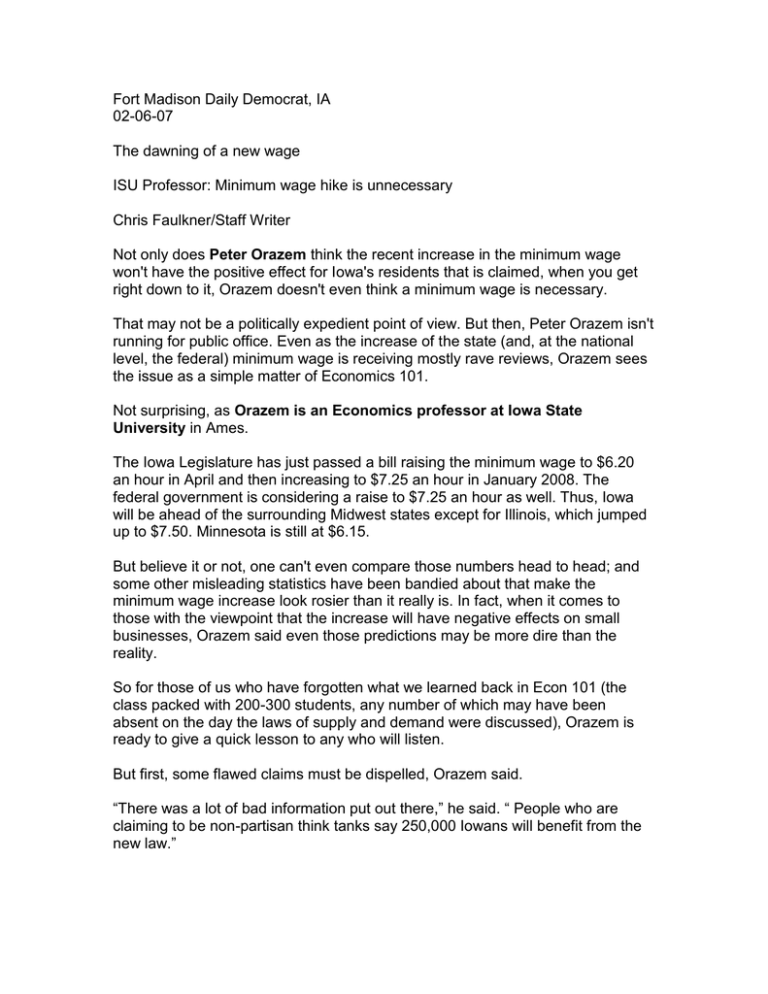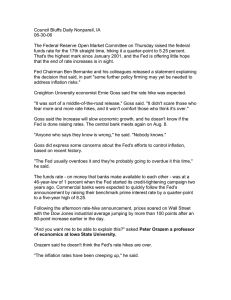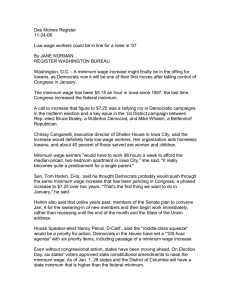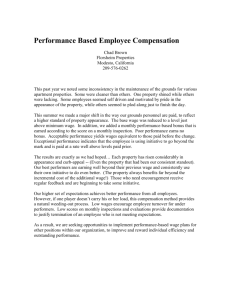Fort Madison Daily Democrat, IA 02-06-07 The dawning of a new wage
advertisement

Fort Madison Daily Democrat, IA 02-06-07 The dawning of a new wage ISU Professor: Minimum wage hike is unnecessary Chris Faulkner/Staff Writer Not only does Peter Orazem think the recent increase in the minimum wage won't have the positive effect for Iowa's residents that is claimed, when you get right down to it, Orazem doesn't even think a minimum wage is necessary. That may not be a politically expedient point of view. But then, Peter Orazem isn't running for public office. Even as the increase of the state (and, at the national level, the federal) minimum wage is receiving mostly rave reviews, Orazem sees the issue as a simple matter of Economics 101. Not surprising, as Orazem is an Economics professor at Iowa State University in Ames. The Iowa Legislature has just passed a bill raising the minimum wage to $6.20 an hour in April and then increasing to $7.25 an hour in January 2008. The federal government is considering a raise to $7.25 an hour as well. Thus, Iowa will be ahead of the surrounding Midwest states except for Illinois, which jumped up to $7.50. Minnesota is still at $6.15. But believe it or not, one can't even compare those numbers head to head; and some other misleading statistics have been bandied about that make the minimum wage increase look rosier than it really is. In fact, when it comes to those with the viewpoint that the increase will have negative effects on small businesses, Orazem said even those predictions may be more dire than the reality. So for those of us who have forgotten what we learned back in Econ 101 (the class packed with 200-300 students, any number of which may have been absent on the day the laws of supply and demand were discussed), Orazem is ready to give a quick lesson to any who will listen. But first, some flawed claims must be dispelled, Orazem said. “There was a lot of bad information put out there,” he said. “ People who are claiming to be non-partisan think tanks say 250,000 Iowans will benefit from the new law.” But, Orazem said, “Half of that number are (already) being paid over $7.25 an hour. Suddenly you double the number of people who are going to benefit,” he said. “What evidence is there of that?” Even his own daughter started work at a restaurant - and not as a waitress making $7.25 an hour. Orazem said the portion of the labor force in minimum wage-type jobs is 60 percent. But the percentage of those workers who actually get just the outgoing minimum wage of $5.15 an hour is just .4 of one percent. That's 2.4 percent of the overall work force. Based on the previously mentioned 250,000 Iowans in minimum wage jobs, that means roughly 1,000 people will get the new raise. Even they, however, shouldn't run out and buy the latest in large-screen televisions. Nor should those making above the $7.25 figure look forward to the rising tide lifting all the boats. Econ 101 “If you increase the price, you lower the demand,” Orazem said. The average person who works for someone else thinks in terms of items they might purchase. But it applies to the business owner as well. “Part of the reduction is in terms of the number of jobs,” Orazem said. “Also, the reductions in hours worked. “Whether or not it benefits the low-skilled workers depends on whether the demand for labor will go up or down. If wages are increasing, we expect hours will decrease,” Orazem said. “Half of the minimum wage population works less than 35 hours a week. Employers will cut back on hours. Earnings for the target population will actually decline.” A business owner only has so much money to work with to spend on payroll. “ A disproportionate share are in retail or low-skill service sectors, restaurants and entertainment,” Orazem said. “ Do you stay open until 8 p.m.? You might, if you can generate sales to meet expenses. But if you need a couple of staff you might just shut down earlier.” Those who are skeptical of this may read a published paper by Orazem and Peter Mattila, another ISU professor. “We did a study of what happened to the earnings of (minimum wage workers) the last time Iowa had a higher minimum wage than the surrounding states,” he said, referring to the period between 1990-92. “On average, their earnings fell,” Orazem said. “It's published. But (politicians) are not interested in it. It's not politically expedient. It wasn't that employment fell. Hours per worker fell.” Proponents of the minimum wage increase point to the fact that the amount hasn't risen in 10 years. But Orazem said, “Last year, average wages in Iowa increased four percent, and there weren't any changes. Now the minimum wages are going to rise. Firms can only pay what they can afford. Do we have to coerce some firms to give out more? There are firms on the margin, and raising wages will be very expensive for them.” Different standards Aside from all that is another overlooked number. Most newspaper readers have seen the handy chart showing the minimum wage of each state. That chart showed Iowa behind Minnesota ($6.15), Missouri ($6.30) and Wisconsin ($6.30). What the chart didn't show was what businesses were required to even pay minimum wage. Iowa businesses having $300,000 worth of sales (roughly $800 per business day) are required to pay minimum wage. Had lawmakers not raised the $5.15 figure, an employee in a northern county might want to cross the border into Minnesota for a higher wage at a similar type business. But ... “Minnesota has higher average wages (than Iowa), but they have a higher minimum (of sales), $625,000, before (a business has to pay minimum wage). The federal average is $500,000.” Orazem said that $800 a day represents a small firm, which means Iowa small businesses are at a disadvantage by having to pay out more in payroll than their competitors on the border states. Although much was said about indexing the minimum wage to inflation, Orazem pointed out that the minimum required sales are not tied with inflation. Orazem said businesses will eventually adapt, so he's not predicting an economic crisis. But for all the hoopla about the increase, Orazem said, “The law is unlikely to have a huge impact.” So why the raise? If the raise isn't all it's cracked up to be, why is it being trumpeted as the pot of gold at the end of a rainbow? “It's politically expedient because you can claim you're helping the poor without having to raise taxes,” Orazem said. “But it's an unfunded mandate.” It also doesn't help the poor. “A disproportionate percentage of the workers are not poor,” Orazem said. “They're teenagers and some come from wealthy families. “If we really cared about the poor, we would target the poor,” Orazem said. “The Earned Income Tax Credit targets the poor very effectively.” But it comes out of the state's budget. Food stamps and housing subsidies are also better for helping the poor, he said, and those also depend on government having the funds to put the money in those areas come budget time.






